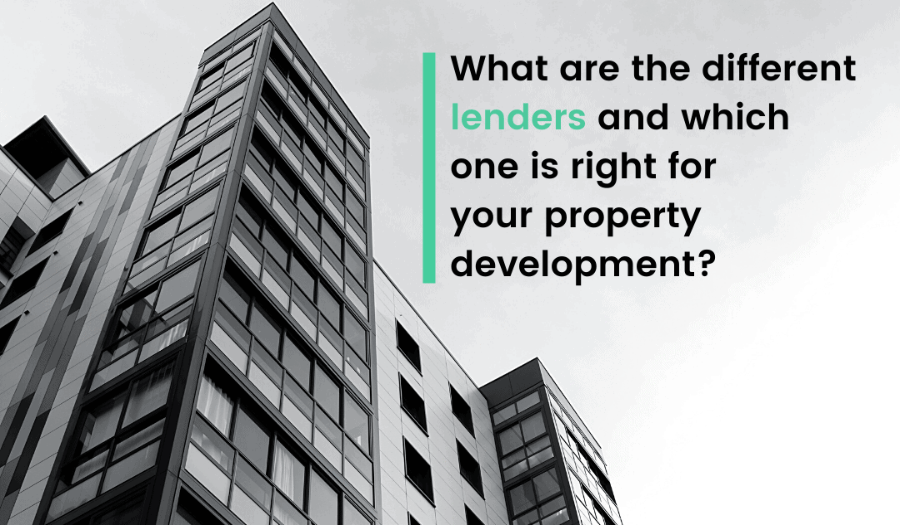
Understanding the various property development lenders and picking the right one
by Marshall Condon | July 15, 2020
With so many lenders in the market, it can be confusing and intimidating trying to get your head around all the options. This includes how each type of lender operates and what they fund.
When deadlines are tight – a frequent occurrence in the property development world – the last thing you want to be doing at crunch time is having to make a rushed decision with incomplete information about your choices.
Selecting the right type of loan for your development can be a lot to get your head around. However, choosing the right lender can save you time, money, and frustration and potentially help you avoid making an expensive mistake. Here is a breakdown of the various types of lenders and how they operate:
Traditional lenders
Lenders that fall into this category are the major banks, such as ANZ, Commonwealth, NAB, and Westpac. Most of them offer a range of commercial property loan products and usually have a team of qualified bankers available for consultation.
If you’re looking at a more traditional commercial investment like a warehouse or office, the major banks can usually offer a pretty sharp rate. However, these traditional lenders are risk-averse, so you’re unlikely to maximize your leverage. Most will usually only offer a 65% Loan-to-Value Ratio (LVR) and have more restrictive conditions as a result of higher capital ratios and tighter lending standards imposed by the Australian Prudential Regulation Authority (APRA).
Institutional lenders
As the name suggests, this category of lenders is usually superfunds and investment banks. They invest a large part of their funds in corporate, government, and municipal debt securities, although they do participate in mortgage loan pools and also offer investment loans suitable for property development. Their lending and investment activities are regulated by law to limit risk.
Smaller banks and building societies
Lenders in this category offer commercial lending for property developments. They may provide funding with better conditions than traditional banks, with a higher LVR, but this usually comes at the cost of higher rates and fees. These lenders have more leeway and flexibility with loan approvals; for example in what they consider as a reliable income source.
Real estate syndicates
Property syndicates have been popular in Australia for many years as a way for investors to build their portfolios. A syndicate is formed by a group of people coming together and pooling their capital for investment in commercial, retail, or industrial properties.
Syndicates are quite targeted in their investment, as the participants have agreed upfront on loan parameters like industry, loan terms and size, interest rates, and the credit score of the borrower. As a result, you’ll need to fall in their ‘sweet spot’ to be eligible for funding. Loan periods are usually 12-18 months.
Specialty lenders
These lenders operate in the riskier portion of the property development financing market and may operate right across the capital stack. They are more likely, for example, to consider lending to developers who have failed to meet the traditional banks’ credit policies. This type of lending comes at a price though. Because the risks are greater for these lenders, they will want a better return by asking for higher rates.
Private lenders
This category of lenders usually comprises syndicates of investors or wealthy individuals. They are more suited to short-term (3-6 month) lending and usually demand higher setup and ongoing costs compared with the big banks. Their lending criteria is, however, less rigid and they’re more flexible and customer orientated, with quicker lending decisions and turnaround times.
You’ll generally experience quicker approvals and customized lending and repayment terms with private lenders. On the downside, you can expect to pay higher interest rates.
What type of lenders does Wefund have on their panel?
Through our cutting-edge platform, Wefund gives property developers access to a trusted pool of Australia’s specialist non-bank lenders. They comprise a mix of reputable non-bank lenders that are both reliable and experienced. We exclude private lenders.
Why use Wefund for your property development financing?
Wefund manages your application and transaction information through our portal, meaning it’s quicker and easier to conclude your deal. We identify the best fit for your funding requirements, then present that opportunity to the lenders that are best suited to provide that finance. This process is based on a proven structure used by Australia’s best commercial brokers, such as Wefund.
Wefund is more than just a technology platform, however. Our specialist team supports you to structure your application before it’s presented to the most appropriate lenders on our platform. After reviewing all the information, lenders are then free to submit their terms to finance a deal.
Our process
- Loan application submitted through the Wefund platform.
- Applications will be reviewed by the Wefund team within 24 hours.
- A deal is structured by our experienced construction lending team and presented through our platform to the most suitable lenders
- Borrowers receive transparent offers outline fees, interest rates, and conditions so they can make an informed decision
- Borrowers accept the indicative offer from their chosen lender
- Wefund manages your loan application from offer to settlement to ensure a seamless process
What’s next?
Click here to start your loan application: https://platform.wefund.com.au/register
RECEIVE UPDATES

Have a loan scenario?
Find out how wefund can help you with fast, transparent non-bank property and development finance. Provide your scenario details below and we’ll get back to you right away.
© 2026. All rights reserved.



